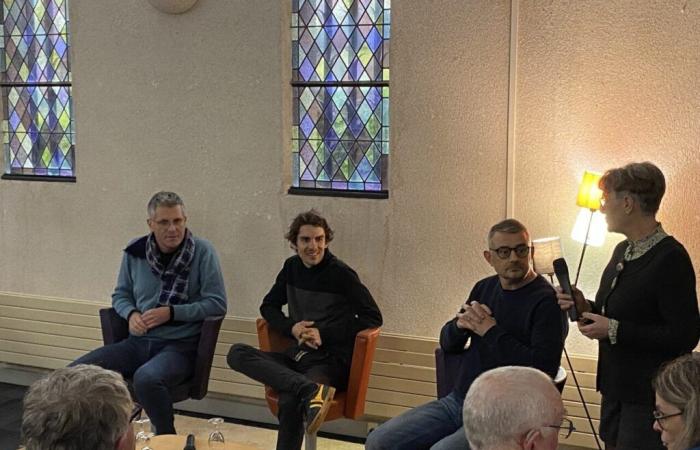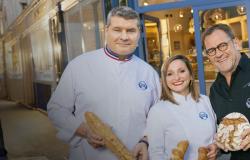
Par
Editorial Flers
Published on
Jan 3, 2025 at 6:11 p.m.
See my news
Follow L’Orne Combattante
Saturday December 21, 2024upon returning from an internship in Spain, Guillaume Martin-Guyonnet came to meet his readers and supporters accompanied byOliver Haralambon.
What these two men have in common is that they are both writers and philosophers and both had careers as professional cyclists. Career still current for the local Guillaume Martin-Guyonnet, who, at the age of 31 ansbegins its 2025 sports season with a new sports team: Groupama-FDJ.
Vincent Revers, who moderated this meeting, discussed several themes with the two guests, who also answered multiple questions from the many participants. Cross interview.
Does this dual role of cyclist and writer still cause people to react?
“If there are two of us in the room, it’s because it’s not that rare. It’s this question that is strange, the people who ask it put people in boxes and we have to fight against these prejudices” answers Guillaume Martin-Guyonnet.
For Olivier Haralambon, “it is rather a story of curiosity, a cultural strangeness anchored in our civilization, in which the head and the legs are separated even though they work together, you need a body to think. I was first a cyclist before becoming a writer and philosopher, I did not do both at the same time like Guillaume.”
Physical suffering represents 90% of my time.
Does writing affect cyclist performance?
For Olivier Haralambon, “the professional cyclist’s lifestyle did not quite suit me: I missed the lack of intellectual questioning, I was looking for better well-being, because there is not only well-being in the bike. I had difficulty enduring this special life among runners, always on the move, I was unhappy with this special life which was imposed on me and which did not suit me. I didn’t find my balance there.”
For the current professional cyclist, “physical suffering represents 90% of my time, between training, the search for sensations, weather that is not what we hope for. But the 10% catch up with the rest, with a form of fullness. The activity of writing has things in common with cycling: it is 90% laborious, it is also a test of endurance, because writing requires devoting time to it. We don’t see the results straight away, we are in doubt, we have to distance ourselves from what we have written. I find the same discomfort, I cling to this 10% share that I have in both activities.”
How does the body resist writing?
“Technically speaking, I never write for long in a row, because I get bored. By bike, I manage to be consistent, I devote 6 to 7 hours a day to my bike rides, but with my hyperactive nature, I need to do a series of activities. Before becoming a professional, during my studies, I switched from cycling to studying, which meant that I never got tired of it: I had the social life of the peloton, but I was not in the cycling world all the time , I also had the school and university world and vice versa,” declares the athlete.
He adds, “I don’t have a writing routine, because the cycling activity doesn’t really allow me to do it and I wouldn’t like it either, my job is that of a cyclist and I write after the bike. Typically, I train in the morning and early afternoon. I have a few hours left in the day, when I feel like it. I write a lot in transport with all my travels. I write after returning from the races, especially when things have gone badly, to evacuate the disappointment and to validate myself, to turn towards something positive, a sort of illusion that I have for myself.”
For Olivier, “writing is like riding a bike, you have to aim for voluntary work and regularity at the same time. You have to agree to stick to a voluntary strategy that doesn’t happen the same way every day. It’s a fantasy to write, no one is ever satisfied with what they write, there is a lot of tinkering, training, like in cycling.
Does reflection have an influence on performance?
“When the sprint is launched at more than 70 km/h, you shouldn’t think or weigh the pros and cons, it’s too late. There are a lot of decisions that call on a form of intelligence, but not on the intellect, it’s more of an instinct,” believes Guillaume Martin-Guyonnet.
For Olivier Haralambon, “everything is always physical: like learning a musical instrument, you have to repeat gestures to abandon this part of reflection, to entrust your body with a certain number of reflexes. It is a perceptual intelligence, which relates to an intuitive dimension.”
What is the impact of earflaps?
For the professional cyclist, “the instructions given via the earpieces depend on the sports director, whether he respects the cyclist’s part of improvisation or not. Because he doesn’t see what I can see in the middle of a peloton. This desire to control things is due to the stakes, directors want to have their back, especially in big teams. With the earpieces, it is easier to control a breakaway, to give the gaps in real time to come back more easily. This reduces risk-taking, it’s sad for the show, the results are predictable in advance. Putting forward the safety argument for using earphones is not the right one, because they are dangerous when you go downhill at high speed.”
Is it frowned upon to have these two activities by the platoon, the director? To enter two different boxes?
“These questions are more those of the journalists than those of the peloton, there are no strange looks from teammates or the peloton. We meet a mix of genres with people from all backgrounds, we don’t judge each other, everyone has their own activity besides cycling, one of my teammates plays the biniou in a bagad” assures Guillaume.
For Olivier, professional cyclist from 1987 to 1996, “the sociology of the peloton has evolved, society has evolved, before cycling was a popular sport, for workers and farmers, today cycling affects more of the middle class, with more diversity in every way.”
The younger generation analyzes figures a lot with power sensors and is not very attentive to their feelings, this is linked to the digital society.
Do the endomorphins secreted during exercise help with writing?
“It’s the notion of activity that counts, the mind is very active after physical activity, it’s a way of maturing. What prevents you from thinking is depression. However, discomfort in writing is a way to overcome it, to transfigure it, or to sublimate it. Many suffering authors have produced very beautiful writings. Some stories are born when an event has gone badly, it inspires and gives meaning to the event. A fictional story puts meaning back into one’s life, making a story about it offers the opportunity to reclaim things that have escaped us,” explains Olivier Haralambon.
For Guillaume, “in their novel, the writers make analyzes from a distance of what they do not know how to experience. This is also the starting point of my latest novel. People who dream that I wanted to call Happy fools. Writers give meaning to things that have no meaning.
How has the peloton evolved in ten years?
For the professional cyclist, “the peloton has changed quite a bit over the last 4-5 years, with a generation of young riders aged 19-20, very efficient compared to when I started 10 years ago when the average age was more high. Some teams have a real policy towards young people. That of Groupama-FDJ has an average age of 23-24 years, that makes me feel old, I am one of the old ones. If you become a professional at 19-20, you stop studying, you can’t do anything else on the side. The younger generation analyzes figures a lot with power sensors and is not very attentive to their feelings, this is linked to the digital society.”
Isn’t this young age convenient for building runners who will have less critical thinking?
“These young people are physiologically ready, but psychologically I had doubts. But no, they have a head on their shoulders, are ambitious, know how to respond to journalists and accept this form of pressure. It is this form of assurance that must be valued and which demonstrates a sort of freedom of mind, but which leaves less and less room for improvisation.”
For Olivier, “it depends on the teams, some are more aware of their responsibility for the training of human beings, like in companies”.
I would also like to have more time to write.
What is your vision of this perpetual search for performance, beyond the physical limit, the use of doping?
“I hope that doping is not the only way to surpass one’s limits, to become more efficient: more precise training, developments in equipment, in nutrition. There are many aspects of performance beyond the question of the raw talent of the rider,” says Guillaume.
For the other guest, “performance means breaking through one’s form, it is a mystical metaphysical unknown of surpassing, of the idea of going beyond, of going above the limit. Previously, riders were heavily doped and put themselves in danger. Today, physiological knowledge has evolved well, we can know how to place our effort, adapt it as closely as possible to our abilities, we have knowledge of performance which makes things safer.”
In the last Tour de France, “carbon monoxide inhalation was used by certain teams of riders, because as long as it is not prohibited, it is authorized, and not classified as doping. This raises an ethical question. If we ban it, how do we control it? The infusion of vitamins and glucose at the end of a stage is a prohibited method, but how can we control it? » questions Guillaume.
How do we live inside a peloton when there are teams next to us who are cheating?
“I stopped caring about what others do, we can’t do otherwise,” declares the professional.
How do you see yourself in the future? Will writing become your main activity or will it remain a passion?
“I’m hyperactive, I have a little trouble projecting myself. The end of my career is approaching, I will always have several activities, I have the Boderie estate of Sainte-Honorine-la-Chardonne to manage and I would also like to free up more time to write,” predicts the Norman.
Follow all the news from your favorite cities and media by subscribing to Mon Actu.





